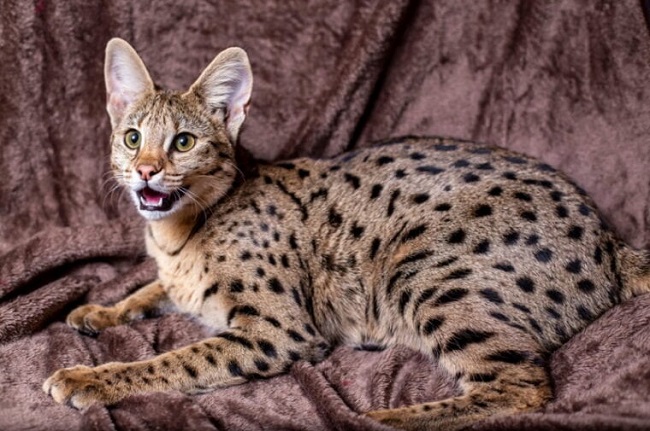Savannah cats, known for their stunning looks and intriguing personalities, are a popular choice among feline enthusiasts worldwide. These exotic cats are a cross between a domestic cat and the serval, a wild African cat.
As captivating as they are, Savannah cats also come with a hefty price tag. So, what factors contribute to the high Savannah cat price?
In this article, we’ll explore the cost of owning a Savannah cat and why these extraordinary pets are worth the investment.

Savannah Cat Price: Factors at Play
Several factors influence the price of a Savannah cat, including their generation, the breeder’s reputation, and the cat’s age, size, and color. Let’s explore these aspects in detail.
Read Also:
Generation
The “generation” of a Savannah cat refers to how closely related the cat is to its wild serval ancestor. The first generation, or F1 Savannahs, have a serval as one parent, making them 50% wild.
F1 Savannahs are the largest and most visually similar to servals, hence, they’re the most expensive, with prices ranging from $12,000 to $20,000.
Each subsequent generation (F2, F3, and so on) is further removed from the serval, smaller in size, and less expensive. For instance, F3 Savannahs generally range from $1,500 to $4,000.
Breeder Reputation
Reputable breeders who prioritize the health, temperament, and quality of their Savannah cats typically charge higher prices. These breeders ensure genetic testing, proper healthcare, socialization, and often provide pedigree papers and a health guarantee.
Age, Size, and Color
Kittens are usually more expensive than adult cats due to high demand. The size of the cat can also impact the price, with larger cats generally costing more. Additionally, certain coat colors or patterns may be more desirable and thus command higher prices.
Ongoing Costs of Owning a Savannah Cat
Aside from the initial purchase price, prospective owners should consider the ongoing costs of owning a Savannah cat. These may include:
Food and Dietary Supplements
Savannah cats have a higher metabolism than most domestic cats and may require a special diet or supplements. This can contribute to higher food costs over the cat’s lifetime.
Veterinary Care
Routine vet check-ups, vaccinations, and emergency care are essential elements of responsible pet ownership and should be factored into the overall cost.
Insurance
Pet insurance can help cover unexpected veterinary costs, but premiums can be higher for exotic breeds like Savannah cats.
Toys and Enrichment
Savannah cats are intelligent and active. They need mental and physical stimulation, which means investing in toys, play equipment, and possibly even cat-safe outdoor enclosures.
Savannah Cat Registration and Legalities
While adding a Savannah cat to your family can be an exciting prospect, it’s essential to consider legal restrictions and registration requirements.
Legal Restrictions
In some areas, owning a Savannah cat, especially early generations like F1 and F2, is subject to legal restrictions or outright bans due to their wild ancestry.
For example, in some US states, specific permits are required, while other states prohibit ownership entirely. Similarly, certain countries have regulations regarding Savannah cats. Before deciding to buy, check your local and state regulations to ensure legal ownership.
Registration
Registration with a cat association, such as The International Cat Association (TICA), adds value to a Savannah cat.
Registered cats come with a pedigree that traces their lineage, providing proof of their purebred status. Registered breeders are also more likely to follow ethical breeding practices.
Choosing a Reputable Savannah Cat Breeder
Choosing a reputable breeder is crucial when considering a Savannah cat. Here’s what to look for:
Health Guarantee
Reputable breeders will offer a health guarantee that covers certain genetic conditions for a specified period. This demonstrates their confidence in the health of their cats and their commitment to breeding healthy animals.
Transparent and Open
Good breeders are transparent about their breeding practices and are willing to answer all your questions. They should let you visit the cattery, meet the kittens and their parents, and show proof of health tests.
Positive Reviews and References
Look for breeders with positive reviews and ask for references from previous buyers. This can give you a good indication of the breeder’s reputation and reliability.
Preparing Your Home for a Savannah Cat
Savannah cats are active and need plenty of space to run, jump, and play. Before bringing your new pet home, ensure you have:
Safe Spaces
Your home should be cat-proofed to prevent accidents or escapes. This is especially important for Savannah cats, who can jump exceptionally high and are known for their curiosity.
Enrichment Items
Invest in quality enrichment items such as scratching posts, climbing trees, interactive toys, and puzzle feeders to keep your Savannah cat entertained.
Proper Litter Box
Savannah cats prefer large, clean litter boxes. Make sure to have a suitable one ready before your new pet arrives.
Read Also:
Conclusion
While the Savannah cat price might seem steep, many owners believe the companionship, beauty, and unique personality of these exotic cats make them worth the investment.
However, it’s essential for potential owners to consider not just the initial cost but also the ongoing expenses to ensure a happy, healthy life for their Savannah cat.
























